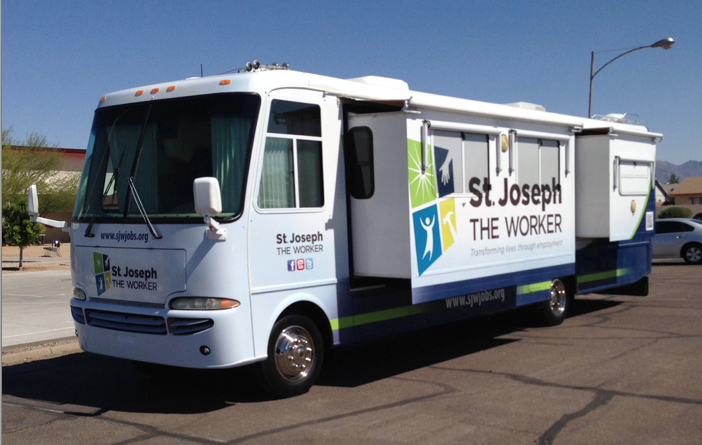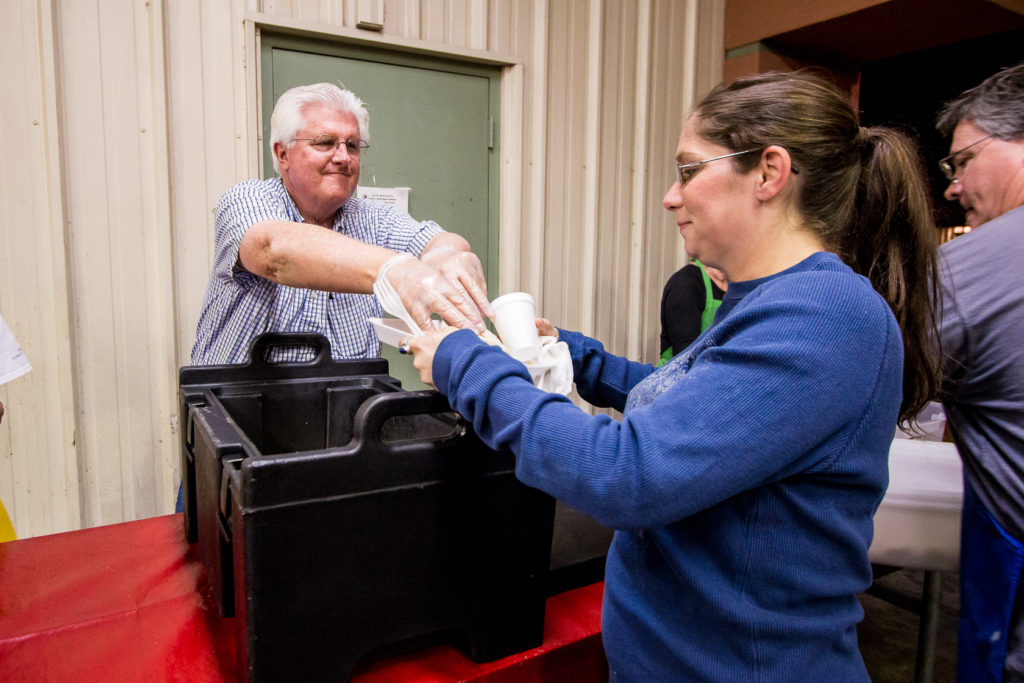

Loren Froehling walked out of Durango Jail two months ago and right into a brighter future.
Parked curbside was a 36-foot RV transformed by St. Joseph the Worker into a Mobile Success Unit, a job development office on wheels that greeted him and 15 other men with the opportunity to receive clothing, hygiene items and bus passes.
Launched in May, the recreational vehicle visits 16 different locations throughout the Valley of the Sun in the course of a month.
It’s staffed with two full time employees who bring crucial employment information from the main facility in downtown Phoenix on the road.
“We have been very good at what we’ve been doing the past 25 years,” said Candace Sherwood, director of development at SJW. “We’ve been saying, ‘Come see us and let us help you,’ but now we can come to them.”
The mobile unit has computers to create and print resumes, internet access to online job-searches, professional clothing and assistance with interview techniques.
The first-of-its-kind portable office also has uniforms, shoes, tools and financial assistance for professional certification/licensure fees.
But there’s a catch.
Low-income and homeless individuals seeking employment services offered by St. Joseph the Worker have to do their part.
Four other men besides Froehling, who was released from jail two months ago after serving a year on drug charges, took advantage of the mobile unit parked outside the jail. Froehling took the initial help and capitalized on it. The 30-year-old Chicago transplant found employment on his own within the month and St. Joseph the Worker helped him purchase equipment for his job in the construction industry.
“When I got out I had no clothes, nothing. They gave me clothes so I could look presentable, gave me job leads and bus passes to get there,” Froehling said. “I realized St. Joseph the Worker could give me tools to survive. I got everything.”
Making the difference in the life of another person is possible each year through the Arizona Working Poor Tax Credit.
[quote_box_right]
Year-End Tax Credit Opportunities
- St. Joseph the Worker
- Paz de Cristo
- Catholic Education Arizona
- Society of St. Vincent de Paul
- Foundation for Senior Living
- Catholic Charities
[/quote_box_right]
“We are privately funded, which means we rely on the financial support of our community to help individuals gain employment, get back on their feet and become contributing members of our economy,” Sherwood said. “But our work will only go as far as our funding allows.”
Arizona law (ARS 43-1088) provides a dollar-for-dollar tax credit for contributions made and postmarked by Dec. 31 to charities that provide assistance to low-income individuals in Arizona.
“One hundred percent of the people we serve are at or below the poverty level — they are the working poor,” Sherwood said. “They need our help to regain control of their lives and build a secure future.”
Married couples filing jointly can receive a maximum tax credit of $400. Singles, an unmarried head of household or married filing separately may receive a maximum tax credit amount of $200.
During the 2012-2013 fiscal year, St. Joseph the Worker helped 2,457 people go back to work and more than 3,800 individuals received services ranging from one-on-one job search assistance to job-readiness resources and referrals.
Feeding the hungry

Paz de Cristo Outreach Center was founded by St. Timothy Parish in Mesa 26 years ago so the hungry could get a daily meal.
It became its own 501(c)(3) organization with tax exempt status eight years ago.
According to Arlen Westling, director, 70 percent of the budget goes to food. The center serves 300 meals every day of the week in addition to providing 1,300 food boxes to the working poor, seniors and single-parent households as well as other services and support.
“Essentially we want to drive ourselves out of business,” Westling said. Until that day comes, however, the center is also dependent on tax credits.
“That’s a large part of our yearly income,” he said. “It’s a huge opportunity for us and the advantage is they are giving locally to support the poor.”





